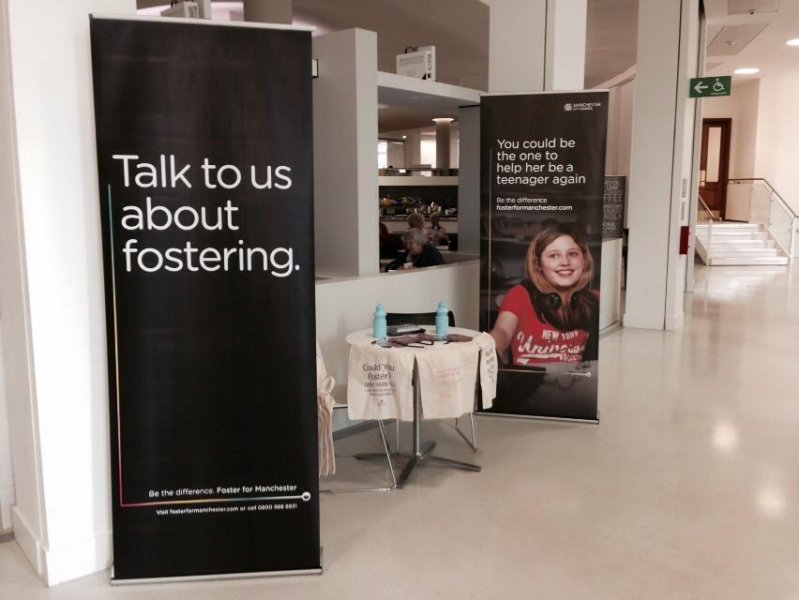Attracting and Keeping Carers - July 2014
I was surprised not to see some examples of fostering services using the sporting initiatives to tie in with recruitment activity. If any fostering service did do something sporty within or indeed beyond the realms of copyright, please send me your examples and prove me wrong!
Private fostering has been in the news this month. Somebody else’s child was the theme for this year’s Private Fostering Week, running 7-13 July, with a number of services using the opportunity to raise awareness. No easy task even with the help of Kriss Akabusi.
Back with mainstream fostering, there is of course still some adrenaline pumping content to share with you this month, which recruitment colleagues have kindly sent through. Keep them coming via james.foyle@fostering.net
Bungee jumpers step forward…
A foster carer, a looked after child and a birth child were among a group of daredevils who have been raising funds and awareness of fostering through a series of bungee jumps.
The initiative co-ordinated by Compass Fostering ‘sprung into action’ in Brighton, with other jumps taking place across the country.
Bernie Gibson, COO at Compass said, “We are always proud of our carers and their families for the amazing contribution that they make through fostering. To go the extra mile by doing a bungee jump to raise vital funds for our partner charities is above and beyond the call of duty, but we’re immensely grateful that they’re taking the plunge!”
Don’t forget that the Fostering Network is a charity too! We’ve had some fantastic fundraising initiatives through our Bake the Difference and Walk the Difference campaigns, and the list of potential activities doesn’t stop there. If you are thinking of combining raising awareness of fostering with a fundraising initiative, do get in touch with our fundraising team.
Manchester appeal
Staff at Manchester Council have been pulling out all the stops in their local foster carer recruitment drive.
With modern and professional branding applied to banners, t-shirts and other marketing materials, the authority has been increasing visibility and local profile of its fostering service in the Manchester area.
 Online too, the team are coming up with some innovative ways to get the message out there with a mix of images and campaigns such as ‘Tell a friend Friday’ and some light-hearted initiatives including their version of Glastonbury, Gortonbury, and snapping their promotional material in locally recognisable places.
Online too, the team are coming up with some innovative ways to get the message out there with a mix of images and campaigns such as ‘Tell a friend Friday’ and some light-hearted initiatives including their version of Glastonbury, Gortonbury, and snapping their promotional material in locally recognisable places.
With a Facebook following of 140 people, there is a great opportunity for the service to do some targeted advertising on Facebook to broaden their reach and engage more of Manchester’s population.
Distorted
Media colleagues and I are occasionally sent stories of foster care by care leavers or foster carers, but this one in particular from a child fostered through Blue Sky Fostering really stood out.
Danielle is 12 years old. Her story is a work of fiction, but covers a number of issues which may be reality for some children in foster care.
We posted Danielle's story as a blog on our website, linking to it from the Fostering Network Facebook page. The post generated lots of engagement receiving 55 ‘likes’, 22 shares and 14, 100 per cent positive, comments.
While I’m not advocating for every fostering service to replicate this initiative and send it in to us, do set aside a few minutes to read through Danielle’s story and consider how something like this could benefit your local recruitment and retention activity.
Singing the Praises of Cornerstone
Some interesting views from a prospective foster carer in this video by Cornerstone, a Christian fostering service.
Encouraging individuals with a faith or religion to consider fostering can be a highly beneficial channel. It is though important for all foster carers to be respectful and open to potentially conflicting religions or beliefs of a fostered child placed with them.
The prospective foster carer does speak positively about the support and training provided by Cornerstone, specifically for those with Christian beliefs, which coupled with the daytime tv-esque studio setting makes this a worthwhile watch.
MTFC vacancy
I came across this ‘fostering vacancy’ in the jobs pages of Jobs Go Public at the weekend appealing for MTFC carers at Barking and Dagenham Borough Council.
I am ordinarily reticent to recommend using such avenues to recruit foster carers for a number of reasons, not least as it can be misleading – even I initially assumed this was for a staff position within the team. I am though interested to hear from any of you who have used this channel and its impact on quality and quantity of enquiries. Drop me a line at james.foyle@fostering.net
IN FOCUS
Staying Put: what it means for foster carer recruitment and retention
From May this year, and following the Fostering Network’s Don’t Move Me campaign, English local authorities have a duty to support fostered young people to stay with their foster families until the age of 21, should both parties agree. Similar rules come into force in the next two years in Scotland and Wales. (In Northern Ireland young people in education, employment or training already have the option to stay.)
So-called “Staying Put” aims to enable a smoother transition for fostered young people into adulthood and give them greater stability and support at a critical time in their life, and has the potential to make a real difference in their lives.
Of course, the decision to ‘stay put’ should not be made last minute. It will be part of the long term trajectory in the young person’s care plan, allowing all parties to prepare and make provision for such an arrangement ahead of time.
Howard Smith, team manager – leaving care at North Yorkshire County Council, spoke at the Fostering Network’s recent Staying Put conference about their experience as one of the 11 Staying Put pilot sites in England, and the service’s experience of implementing similar arrangements since the early 2000s under the ‘supported lodgings’ moniker. Anecdotal feedback from the pilot sites suggests concerns of the schemes potential impact on recruitment and retention through reducing the number of available placements were unfounded. On the contrary, North Yorkshire in particular fed back that it had a positive impact on retention with foster carers taking great pride in assisting their fostered young people into adulthood as part of the formal scheme.
The changes do though give rise to particular elements for foster carer recruiters and retainers to consider:
Update communications
Prospective foster carers need to understand that young people may wish to enter into a staying put arrangement when they reach 18. In fact, they should be encouraged to view both long-term arrangements and taking on young people towards adulthood as involving a commitment to offer a home to young people until at least 21. As such, fostering services are advised to review their communications, including any information packs provided to prospective foster carers and online content, to reflect the changes in legislation and what it means for families, and incorporate into information sessions.
Review needs analysis
Although research to date suggests the impact on placement availability is minimal, it would be prudent for those responsible for recruiting foster carers to identify those who have agreed or are likely to enter into a Staying Put arrangement in order to assess any potential impact on future recruitment needs.
Additional training and support needs
Foster carers need to be equipped with the necessary skills and tools to support a Staying Put arrangement. The young person is no longer in care, so agreements have been made in pilot sites for the young person to make a contribution to the household income, for example either through an agreed portion of their wage or housing benefit. How to access the latter could form part of training, as could how to apply to further education establishments and even a checklist of ‘lifeskills’ to equip the young person with such as healthcare and financial management.
The new Skills to Foster contains material designed to help prospective foster carers support the transition to adulthood through fostering and Staying Put.
DBS checks
As the young person is no longer looked after, they will be considered an adult member of the fostering household. As such, they will require an enhanced disclosure from the DBS if the foster carer chooses to continue fostering.
The foster carer and fostering service are likely to be aware of any issues with the young person, which should be discussed well in advance of the Staying Put agreement should it potentially impact on their ability to continue fostering. This is clearly a matter to handle sensitively and the purpose of which explained to the young person.
The full good practice guide for Staying Put is available via the Fostering Network’s website.
PS
Here’s a fostering-related short film from the US, highlighting the plight of the 5,000 children who are taken into care when their parents are deported. Fans of the Sopranos will recognise the lead female actor, Jamie-Lynn Sigler.
Not as regular an occurrence in the UK, the film still does make the viewer think of how a young child must be feeling when they’re taken into care.





